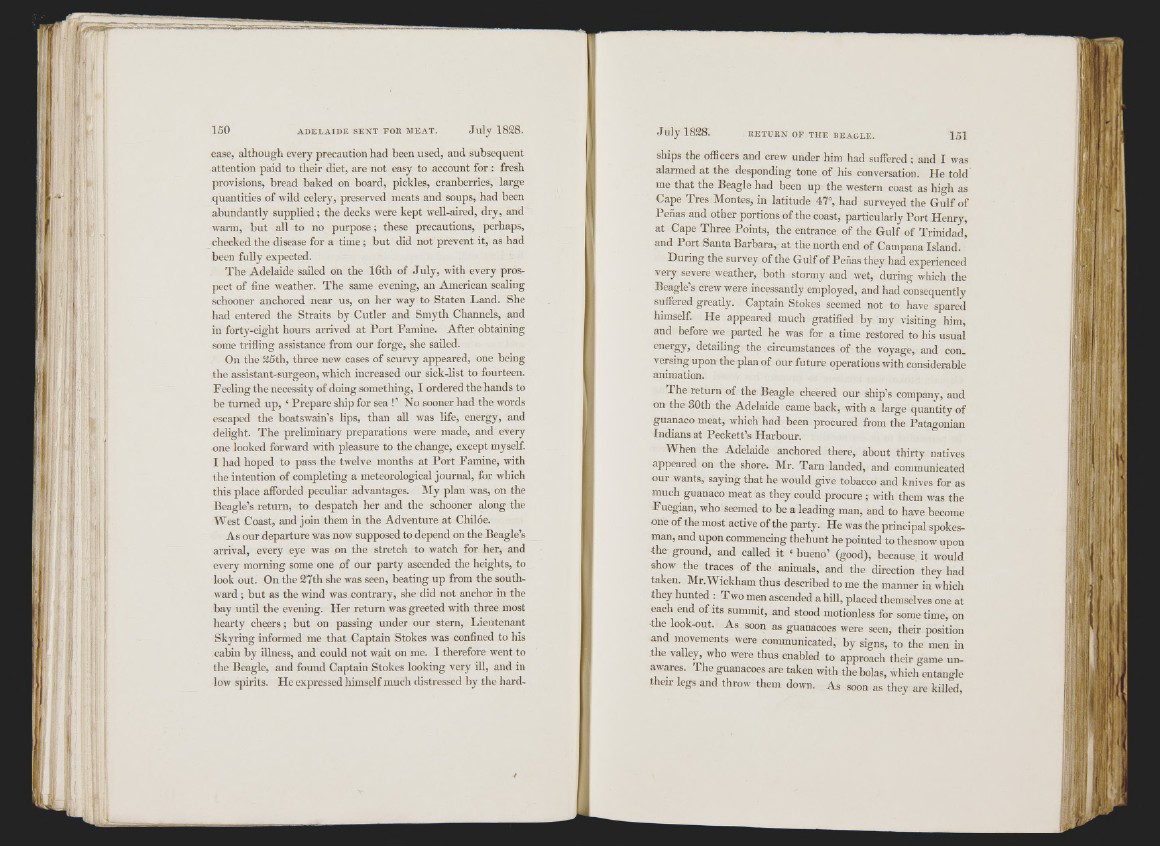
í :
li: ■ t
I ;!
150 A D E L A ID E SEN T FOE MEA T .
ease, although every precaution had been used, and subsequent
attention paid to their diet, are not easy to account for : fresh
provisions, bread baked on board, pickles, cranberries, large
quantities of wild celery, preserved meats and soups, had been
abundantly supplied ; the decks were kept well-aired, dry, and
warm, but all to no purpose; these precautions, perhaps,
checked the disease for a time ; but did not prevent it, as had
been fully expected.
The Adelaide sailed on the 16th of July, with every prospect
of fine weather. The same evening, an American sealing
schooner anchored near us, on her way to Staten Land. She
had entered the Straits by Cutler and Smyth Channels, and
in forty-eight hours arrived at Port Famine. After obtaining
some trifling assistance from our forge, she sailed.
On the 25th, three new cases of scurvy appeared, one being
the assistant-surgeon, which increased our sick-list to fourteen.
Feeling the necessity of doing something, I ordered the hands to
be turned up, ‘ Prepare ship for sea !’ No sooner had the words
escaped the boatswain’s lips, than all was life, energy, and
delight. The preliminary preparations were made, and every
one looked forward ivith pleasure to the change, except myself.
I had hoped to pass the twelve months at Port Famine, with
the intention of completing a meteorological journal, for which
this place afforded peculiar advantages. My plan was, on the
Beagle’s return, to despatch her and the schooner along the
West Coast, and join them in the Adventure at Chiloe.
As our departure was now supposed to depend on the Beagle’s
arrival, every eye was on the stretch to watch for her, and
every morning some one of our party ascended the heights, to
look out. On the 27th she was seen, beating up from the southward
; but as the wind was contrary, she did not anchor in the
bay until the evening. Her return was greeted with three most
hearty cheers ; but on passing under our stern. Lieutenant
Skyring informed me that Captain Stokes was confined to his
cabin by illness, and could not wait on me. I therefore went to
the Beagle, and found Captain Stokes looking very ill, and in
low spirits. He expressed himself much distressed by the hardships
the officers and crew under him had suffered ; and I was
alarmed at the desponding tone of his conversation. He told
me that the Beagle had been up the western coast as high as
Cape Tres Montes, in latitude 47°, had surveyed the Gulf of
Peñas and other portions of the coast, particularly Port Henry,
at Cape Three Points, the entrance of the Gulf of Trinidad,
and Port Santa Barbara, at the north end of Campana Island.
During the survey of the Gulf of Peñas they had experienced
very severe weather, both stormy and wet, during which the
Beagle’s crew were incessantly employed, and had consequently
suffered greatly. Captain Stokes seemed not to have spared
himself. He appeared much gratified by my visiting him,
and before we parted he was for a time restored to his usual
energy, detailing the circumstances of the voyage, and con.
versing upon the plan of our future operations with considerable
animation.
The return of the Beagle cheered our ship’s company, and
on the SOth the Adelaide came back, ivith a large quantity of
guanaco meat, which had been procured from the Patagonian
Indians at Peckett’s Harbour.
When the Adelaide anchored there, about thirty natives
appeared on the shore. Mr. Tarn landed, and communicated
our wants, saying that he would give tobacco and knives for as
much guanaco meat as they could procure ; with them was the
Puegian, who seemed to be a leading man, and to have become
one of the most active of the party. He was the principal spokesman,
and upon commencing thehunt he pointed to thesnow upon
the ground, and called it ‘ bueno’ (good), because, it would
show the trares of the animals, and the direction they had
taken. Mr. Wickham thus described to me tlie manner in which
they hunted : Two men ascended a hill, placed themselves one at
each end of its summit, and stood motionless for sometime, on
the look-out. As soon as guanacoes were seen, their position
and movements were communicated, by signs, to the men in
the valley, who were thus enabled to approach their game unawares.
The guanacoes are taken with the bolas, which entangle
their legs and throw them down. As soon as they are killed,
Jiii
i ,
Ilf
m